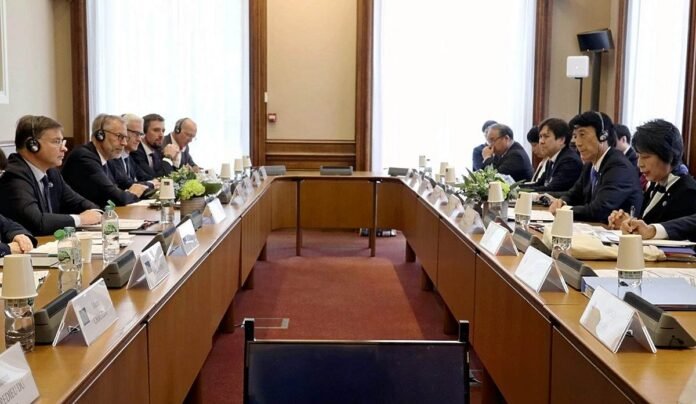Minister of Economy, Trade and Industry Ken Saito, second from right, attends the Japan-EU high-level economic dialogue in Paris on Thursday.
15:52 JST, May 4, 2024
PARIS – Member states of the Organization for Economic Co-operation and Development agreed at the meeting that ended Friday in Paris to work to build resilient and reliable supply chains to strengthen economic security.
Japan also agreed with the European Union to begin coordinating policies on strategic goods. In April, Japan and the United States pledged to strengthen cooperation in the same area.
And amid growing concerns about ‘economic coercion’ with countries pressuring trading partners with trade restrictions, OECD ministers will also accelerate the creation of transparent international rules between like-minded countries.
“We acutely feel the importance of continuing and promoting industrial policy coordination and regulation with countries in North America and Europe and other like-minded countries,” Minister of Economy, Trade and Industry Ken Saito said at a press conference Thursday evening , after the Fifth High-Level Economic Dialogue between Japan and the EU and the OECD Session on Economic Security.
During the OECD session, ministers reaffirmed the importance of working with other countries, including developing countries, based on the principles of trust and transparency, to build more resilient supply chains.
It was the first time that the issue of economic security was intensively discussed during a full session of the Council of Ministers.
“Many countries expressed concerns about economic coercion,” Saito said. The Council of Ministers statement called on all countries to refrain from using economic coercion against trading partners.
During the Japan-EU dialogue, both sides agreed to establish a common rule that they would not depend on certain countries for the supply of strategic goods such as batteries.
Valdis Dombrovskis, executive vice-president of the European Commission, the EU’s executive body, stressed that the issue should be addressed not only by Japan and the EU, but also in cooperation with other like-minded countries.
As for the United States and Japan, the two agreed at a summit in April to strengthen supply chains for strategic goods.
As the United States and the EU are also in talks to coordinate their industrial policies, Japan, the United States and the EU have started building supply chains that are not dependent on countries like China.
By striking deals now, Japan plans to “lock in” its policy direction, as one government source put it, before the United States holds presidential elections in November and the EU holds parliamentary elections in June, signaling a change in Washington politics or Europe will not disrupt international supply chains.



